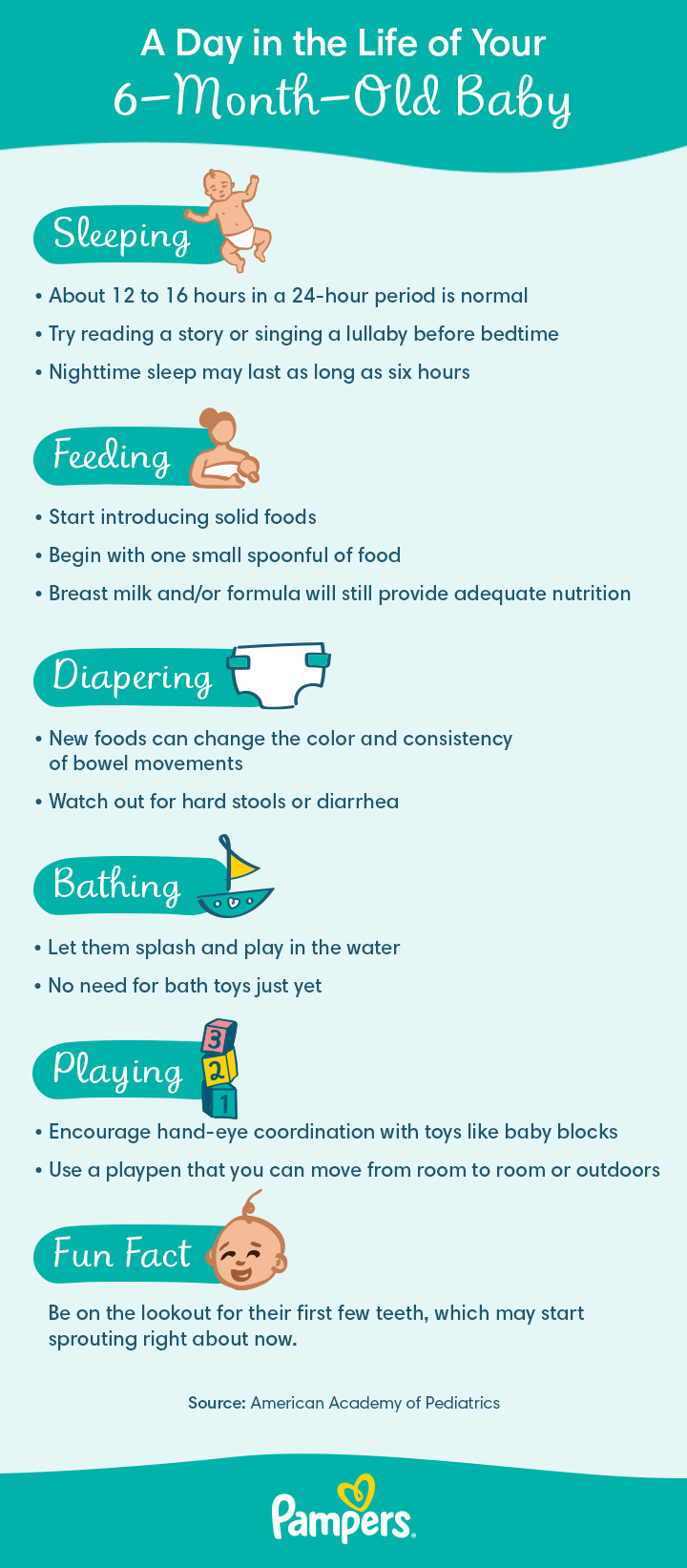
6-Month-Old Baby Care: A Comprehensive Guide for Parents
As your little one reaches the six-month milestone, you’ll witness a surge in their development and a shift in their needs. This comprehensive guide will provide you with all the essential information you need to care for your 6-month-old baby, ensuring their optimal growth and well-being.
Feeding
- Introducing Solid Foods: Around 6 months, your baby is ready to explore the world of solid foods. Start with single-ingredient purees, such as rice cereal, oatmeal, or mashed fruits and vegetables. Offer small amounts and gradually increase the quantity as your baby tolerates them.
- Frequency and Amount: Offer solid foods once or twice a day, starting with a few spoonfuls and gradually increasing to 2-4 tablespoons per serving.
- Texture: Begin with smooth purees and gradually introduce lumpier textures as your baby’s chewing skills develop.
- Avoid Certain Foods: Honey, cow’s milk, and raw or undercooked foods should be avoided until your baby is at least 1 year old.
- Breastfeeding or Formula: Continue breastfeeding or formula feeding as your baby’s primary source of nutrition. Solid foods should supplement, not replace, milk feedings.
Sleep
- Sleep Patterns: 6-month-old babies typically sleep for 14-16 hours per day, with 2-3 naps during the day.
- Establishing a Routine: Create a consistent sleep-wake cycle by putting your baby down for naps and bedtime at approximately the same time each day.
- Night Wakings: It’s normal for babies to wake up once or twice at night. Respond promptly to their cries, but avoid overstimulating them.
- Safe Sleep Environment: Ensure your baby’s sleep environment is safe by placing them on their back in a crib or bassinet with a firm mattress and no loose bedding.
Diapering
- Frequency: 6-month-old babies typically need to be changed 6-8 times per day.
- Wet Diapers: Wet diapers will feel heavy and cold to the touch.
- Dirty Diapers: Dirty diapers will have a strong odor and may contain solid waste.
- Diaper Rash: If your baby develops a diaper rash, apply a zinc oxide cream or petroleum jelly to the affected area.
- Changing Technique: Gently lift your baby’s legs and slide the dirty diaper out from under them. Clean the area with a warm washcloth or baby wipes, and apply a fresh diaper.
Bathing
- Frequency: Bathe your baby 2-3 times per week.
- Water Temperature: Use lukewarm water that is comfortable to the touch.
- Bath Products: Use mild, unscented baby soap and shampoo.
- Bath Time Safety: Never leave your baby unattended in the bath.
- Drying: Gently pat your baby dry with a soft towel, paying special attention to skin folds.
Health and Development
- Growth: 6-month-old babies typically weigh between 14 and 18 pounds and measure between 24 and 27 inches in length.
- Motor Skills: Your baby may start rolling over, sitting up with support, and reaching for objects.
- Cognitive Skills: Your baby will become more interactive, recognizing familiar faces and objects.
- Social Skills: Your baby will start to show affection and respond to your voice and touch.
- Immunizations: At 6 months, your baby will receive the following immunizations: DTaP (diphtheria, tetanus, and pertussis), Hib (Haemophilus influenzae type b), and PCV13 (pneumococcal conjugate vaccine).
Safety
- Supervision: Never leave your baby unattended.
- Choking Hazards: Keep small objects and choking hazards out of your baby’s reach.
- Falls: Prevent falls by using a baby gate at the top and bottom of stairs.
- Car Safety: Always use a rear-facing car seat in the back seat of the car.
- Water Safety: Never leave your baby unattended near water.
Other Care Tips
- Tummy Time: Encourage your baby to spend time on their tummy to strengthen their neck and back muscles.
- Massage: Gentle massages can help soothe your baby and promote relaxation.
- Teething: Around 6 months, your baby may start teething. Offer teething toys or a cold washcloth to help relieve discomfort.
- Communication: Talk to your baby often and respond to their coos and babbles.
- Playtime: Engage your baby in interactive play activities, such as reading, singing, and playing with toys.
When to Call the Doctor
- Fever: A fever of 100.4 degrees Fahrenheit or higher.
- Persistent Crying: Crying that lasts for more than 3 hours and cannot be soothed.
- Vomiting or Diarrhea: Multiple episodes of vomiting or diarrhea.
- Rash: A rash that is red, swollen, or painful.
- Difficulty Breathing: Rapid or shallow breathing, or a bluish tint to the lips or skin.
Caring for a 6-month-old baby is a rewarding and challenging experience. By following these comprehensive guidelines, you can ensure your little one’s optimal growth, development, and well-being. Remember to consult with your healthcare provider for personalized advice and support as needed.
